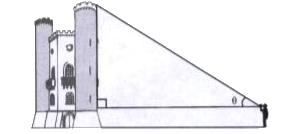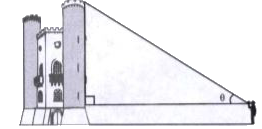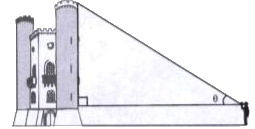"A young child responds to a new situation on the basis of the response made by him/ her in a similar situation as in the past." This is related to
'Law of Attitude' of learning process
'Law of Readiness' of learning
'Law of Analogy' of learning
'Law of Effect' of learning
The correct Answer is:C
Step by step video, text & image solution for "A young child responds to a new situation on the basis of the response made by him/ her in a similar situation as in the past." This is related to by Cdp experts to help you in doubts & scoring excellent marks in Class 14 exams.
Topper's Solved these Questions
Similar Questions
Suppose a girl is sitting on the balcony of her house located on the bank of river. She is looking down at a flower pot placed on a stair of a temple situated nearly on other bank of the river. A right triangle is imagined to be made in this situation as shown in figure.

The angle between foot of the building and river is …….. .View SolutionSuppose a girl is stitting on the balocny of her house located on the bank of river. She is looking down at a flower pot placed on a stair of a temple situated nearly on other bank of the river. A right triangle is imagined to be made in this situation as shown in figure.

Value of sin 60∘ is …….View Solution
Knowledge Check
- Question 1 - Select One
She itself are responsible for this situation of hers.
Aherself isBherself areCNo substitution requiredDoneself is - Question 2 - Select One
Emotions are not caused by situations. Emotions are caused by our beliefs about situations, beliefs that colour our perception and our understanding of events. Beliefs cause emotions that trigger behaviour. If we feel angry about a situation and react in anger, it is because we have angry beliefs about it. If we feel compassionate, it is because we have compassionate beliefs.
Situations in themselves do not produce feelings. It is our perception of the situation that makes us feel good or bad. Just as situations cannot make us happy or sad, another person cannot make us feel happy or sad. If we seek greater freedom in our lives, we need to be objective and rational about the power of our beliefs versus the power of situations. We control our emotions. When we live in freedom, we choose the way we respond rather than let our automatic negative reactions get the better of us.
Now you might ask, 'Okay, but how do I do this ?' how do I chose to respond when I am under pressure, when I have been taught to fear or fight, when the situation seems 'bad' to me ? The "PQR" formula can help us live freely in stressful, anxious or depressing situation. We pause to question how we would like to respond rather than react and live to regret our negative reaction.
Let me try to explain what I mean by react: You push, I shove. Without thinking, I shove. This is my reaction. It is immediate and disconnected from my higher Self, the constant "I", and the meaning of my life. My reaction is an imprisoned effect. This is not freedom.
By applying the PQR formula, however, I can respond. I pause (find myself in the situation), question (How does this situation relate to the meaning of my life? How do I wish to respond given in a world of infinite possibilities ?), and then respond (a freely chosen action-not a reaction). Responding rather than reacting helps us live freely and in greater harmony with our true identity in every situation. It helps us grab hold of the freedom we seek in order to enter into the river of divine life.
Among emotions, beliefs, situations and perceptions which come first ?ABeliefsBEmotionsCSituationsDPerceptions
Suppose a girl is stitting on the balocny of her house located on the bank of river. She is looking down at a flower pot placed on a stair of a temple situated nearly on other bank of the river. A right triangle is imagined to be made in this situation as shown in figure.
Write the value of sin 30∘
 View Solution
View SolutionSuppose a girl is sitting on the balcony of her house located on the bank of river. She is looking down at a flower pot placed on a stair of a temple situated nearly on other bank of the river. A right triangle is imagined to be made in this situation as shown in figure.

If height of her house is 12 m , and the distance between her house and the river is 5 m , then what will be value of sinθ ?View SolutionSuppose a girl is sitting on the balcony of her house located on the bank of river. She is looking down at a flower pot placed on a stair of a temple situated nearly on other bank of the river. A right triangle is imagined to be made in this situation as shown in figure.

If width of the river is 15 m , and angle of depression of flower pot from balcony is 60∘ , then what will be height of the building ?View Solution
Girish wants to participate in the 200m Sprint. He can currently run that distance in 45 sec. But he wants to do that in under 30sec. With each day of practice, it takes him 2 sec less. Respond to the above situation by answering the questions given below
Which of the following forms an A.P for the above given situationView SolutionDo you get angry when your mother switches off the television? Do you get upset when you lose a game? Do you crib when your teacher does not pay attention to you? Most of us can have "yes" as an answer to one or more of these situations. Anger sometimes gets the better of us and leaves us to regret the consequences later. The question is 'How can we control anger?'
Anger is a normal and healthy emotion only if we know how to respond to it. Uncontrolled anger can often ham1 us directly or indirectly whether we realise or not. Before we learn to address the issue, let us revisit the concept of anger. Anger is nothing but ahsence of peace with oneself. people or situations around us. We express it either by being assertive or aggressive.
Let us all become the managers of our own anger. When angry, take a few moments to calm down (take five deep breaths, count up to ten, drink water, change your place) before r.esponding. More often than not we do not nave control over the situations that distress us. Getting physically active reduces stress. Funny dances, clapping, thumping your feet, a walk, making funny faces at the mirror, etc., go a long way in helping us let go of the anger or the frustration inside us. Once we have our feelings under control, go through all the aspects of the situation and try to see the same situation from different perspectives. If it is a problem try to equip yourself with a few solutions before entering
the same situation. Avoid holding a grudge with people and learn when to seek help from others. Realising your own shortcomings can become one of the greatest strengths of character over the
years to come.
We can never control circumstances,people or situations as they are constantly changing. The only thing we can control is our response. So we have to increase our capacity to tolerate, ability to understand, and learn to nurture love for others.
What do you understand by the word 'anger'?View SolutionHow Can We Control Anger?
Do you get angry when your mother switches off the television? Do you get upset when you lose a game? Do you crib when your teacher does not pay attention to you? Most of us can have "yes" as an answer to one or more of these situations. Anger sometimes gets the better of us and leaves us to regret the consequences later. The question is 'How can we control anger?
Anger is a normal and healthy emotion only if we know how to respond to it. Uncontrolled anger can often harm us directly or indirectly whether we realise or not. Before we learn to address the issue, let us revisit the concept of anger. Anger is nothing but absence of peace with oneself, people, or situations around us. We express it either by being assertive or aggressive.
Let us all become the managers of our own anger. When angry, take a few moments to calm down (take five deep breaths, count up to ten, drink water, change your place) before responding. More often than not we do not have control over the situations that distress us. Getting physically active reduces stress. Funny dances, clapping, thumping your feet, a walk, making funny faces at the mirror, etc., go a long way in helping us let go of the anger or the frustration inside us. Once we have our feelings under control, go through all the aspects of the situation and try to see the same situation from different perspectives. If it is a problem, try to equip yourself with a few solutions before entering the same situation. Avoid holding a grudge with people and learn when to seek help from others. Realising your own shortcomings can become one of the greatest strengths of character over the years to come.
We can never control circumstances, people, or situations, as they are constantly changing. The only thing we can control is our response. Therefore, we have to increase our capacity to tolerate, ability to understand, and learn to nurture love for others.
Anger management helps you in (Tick the correct answer.)
(a) remaining always happy
(b) developing strength of character
(c) remaining stress free
(d) learning how to respond to the situationView Solution

